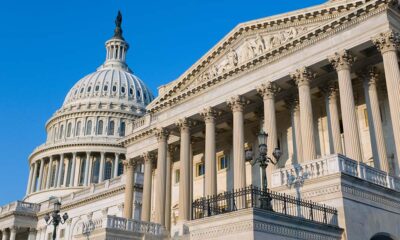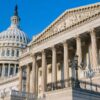
Legal
Crackdown on Cannabis ‘Gray Market’ In NYC Arrives
The long-promised crackdown on unlicensed cannabis sales is a reality now in New York City.
When this reporter took a recent stroll through Washington Square Park, the iconic hub of New York City’s Greenwich Village, the scene was dramatically changed from the ongoing cannabis-themed festival that had become the norm for the past two years.
Now just two tables were set up in the central area around the big circular fountain at the park’s center. The folk at the tables were chanting the familiar refrain of “pre-rolls, eighths, edibles.” But when I made clear I was a reporter and wanted to talk, they responded with a terse “no comment” and motioned me on.
This was a stark contrast to my past journalistic excursions through the park since cannabis was legalized in New York state. Then, as recently as early summer, scores of tables were doing a brisk business and joyous noise and vibrancy (as well as cannabis smoke) infused the air. And the purveyors had been eager to talk to a reporter—to propound on how their activities were legal under terms of the state’s Marihuana Regulation & Taxation Act (MRTA).
Now, it was almost—although not quite—akin to the pre-legalization atmosphere over the generations starting in the late 1960s when the park was a notorious hotspot for strictly illicit pot sales, with dealers circling the iconic fountain and nearby arch, pitching sotto voce to passers-by: “Loose joints, loose joints.”

Clearing Out the ‘Cannabis Casbah’
The summer after MRTA was passed at the end of March 2021, cannabis vendors started setting up tables in the park, openly hawking their wares. The local online newspaper, Village Sun, which has closely covered the scene and attendant controversy, called it a “cannabis casbah.”
The current crackdown follows months of mounting pressure from both the Washington Square Association, the civic organization that promotes the upkeep of the park and the neighborhood’s Community Board 2. These entities complained that magic mushrooms were being sold as well as cannabis (with no cover of law at all). They also called for action on the park’s northwest corner, where hard drugs such as crack and smack are still being peddled, in old-school sotto voce manner. In late June, a man was fatally stabbed on this corner.
And in late August, a man was found dead in what police called a “possible drug OD” around the chess tables at the park’s southwest corner.
There was also a violent incident on July 25, when the city Parks Department administrator for Washington Square, Will Morrison, was attacked while videoing “illegal activity,” and suffered a fractured elbow. This happened on the park’s east side, by the Garibaldi statue just outside the central circle—near the cannabis casbah and far from the white-powder hotspot on the other side of the square. An arrest was made in the attack about a month later, although few more details were forthcoming.
Whatever these unfortunate incidents may or may not have had to do with the cannabis vending, the complaints were lumped together by the neighborhood’s pillars of respectability. Community Board 2 chair Susan Kent told the Village Sun, “There’s been a lot of advocacy for legalization. Now this illegal activity is compromising them. There’s no justification for selling drugs illegally. Period.”
And in the crackdown, the cops have been imposing restrictions even on vendors of artistic creations—for instance, keeping them a minimum number of feet away from benches, the central fountain and monuments, barring them from using beach umbrellas to shield themselves from the sun.
Some vendors took to marching around the fountain to protest, but purveyors of paintings and hand-crafted jewelry have now also been largely cleared.
In late August, the cops made a slew of arrests of the hard drug dealers at the park’s seedy northwest corner.
With the cannabis casbah, the mere threat of arrest seems to have sufficed. However, in a real stain on the park’s cannabis scene, three remnant vendors were arrested on September 7 for making underage sales. Although accounts were not explicit on this point, the arrests seem to have been the result of a sting operation.
City Councilmember Erik Bottcher, whose district adjoins Greenwich Village on the north, has been an aggressive voice for cleaning up the park. He’s calling for beefing up the NYPD’s 6th Precinct, which covers the park, with more officers. Councilmember Christopher Marte, whose district actually includes Washington Square, is calling for a “more balanced approach” and trying to broker a dialogue with stakeholders.
While the Sun’s coverage of the new battle for Washington Square has been in-depth and dogged, it also betrays its prejudices. In an editorial entitled “Target the Drug Dealers,” it accepts without question the phrase “illegal pot vendors.” Before the crackdown, the cannabis merchants took great pains to emphasize that they did not consider themselves “illegal”—merely unlicensed. Many exploited so-called “loopholes” (a term rejected by the vendors), such as offering cannabis as a promotional gratuity with the sale of an objet d’art. Some said they intended to get licensed and were meanwhile complying with the letter of the law. Under MRTA, they pointed out, if no money is exchanged for the cannabis, it’s not a “sale.”
In another term often rejected by the vendors themselves, this homespun sector constitutes what some observers call a “gray market,” with a degree of legal ambiguity, at least—not an outright illicit “black market.”
Stepped-Up Raids on Storefronts
The sweep of the Washington Square casbah by local cops comes as New York state authorities are stepping up their crackdown on unlicensed retail stores, which was launched in the spring.
On June 22, Gov. Kathy Hochul announced in a press release that enforcement actions by state authorities had resulted in the seizure of at least 1,000 pounds and nearly $11 million in “illicit products.” The enforcement drive comes under the purview of a new law signed by Hochul earlier that month, allowing state agencies to levy hefty fines and seize inventory of businesses that sell cannabis without a license.
The Manhattan District Attorney’s Office (now a focus of national attention due to its case against Donald Trump) has also got in on the act. On July 18, it announced that the owner of nearly a dozen “illegal” cannabis shops, Rami Alzandani, is to pay $103,000 to the state Department of Tax & Finance and forfeit another $300,000 in proceeds as part of a non-prosecution agreement.
“Cannabis legalization in New York State was designed to advance racial equity and fairness, and the rules must be followed,” District Attorney Alvin Bragg said in a statement. “Public safety is also harmed when there is such a huge proliferation of unlicensed and unregulated storefronts selling cannabis products that have not been properly inspected.”
City authorities are imposing their own measures to deter unlicensed storefronts. In July, Queens Councilmember Lynn Schulman successfully shepherded through a bill, Intro 1001, that imposes stiff fines on landlords who rent to unlicensed cannabis outlets—$1,000 initially and then another $2,000 for failure to evict in a timely manner.
Upper East Side Councilmember Julie Menin is now pushing a bill, Intro 995, that would require the city Health Department and Consumer Protection Department to launch a “public awareness campaign on the dangers of purchasing cannabis or cannabis products from unlicensed cannabis retailers.”

Persisting Obstacles to Licensed Sector
But the licensed sector is hardly taking up the slack. By a city government estimate this summer, New York City’s unlicensed cannabis shops outnumber licensed ones by about 250-to-1. As an Aug. 18 account in The New York Times noted, under initial projections after the passage of MRTA, there were supposed to be more than 150 licensed dispensaries operating statewide by now. Instead, the figure stands at a mere 23 legal dispensaries, and many of them only offer deliveries.
One obstacle, ironically, has been a slew of lawsuits challenging the program’s “social equity” provisions from would-be entrepreneurs who feel they are being unfairly excluded. The latest, filed in August, is from a group of four military veterans who became disabled during their service. They say they met all requirements for the first round of licensing, reserved for “equity” applicants—with one exception. To qualify for the first-round Conditional Adult-Use Retail Dispensary (CUARD) licenses, an applicant (or a family member) must have a pre-legalization conviction on a cannabis-related offense. The veterans accuse the state Office of Cannabis Management (OCM) and affiliated Cannabis Control Board (CCB) of going beyond MRTA’s mandate by imposing this condition.
“The MRTA had already established a goal to award 50% of all adult-use licenses to social and economic equity applicants. But instead of following the law, OCM and CCB created their own version of ‘social equity’ and determined for themselves which individuals would get priority to enter New York’s nascent adult-use cannabis market,” read a press release from the challengers.
Another group, led by companies already licensed under the state medical marijuana program (but still barred from the adult-use sector), filed a similar suit in March. But they did not demand an actual suspension of licensing.
The veterans did. And the judge who’s hearing both cases, Justice Kevin R. Bryant of the State Supreme Court in Kingston, on August 7 issued an injunction that froze further licensing until regulators start accepting applications beyond the equity program. This is slated to start in the fall, which Justice Bryant said would make both lawsuits moot.
The Cannabis Association of New York nonetheless issued a statement saying it was “severely disappointed” by Bryant’s decision.
On August 25, Bryant issued an order that exempted some 30 applicants from the injunction. These were said by the OCM to be in the final stages of their application process. But four days later, Bryant reversed that ruling after hearing additional arguments from attorneys for the veterans.
So, at press time, the licensing process remains suspended.
First Licensed Open-Air Market
Thankfully, a positive alternative to the unlicensed casbah in Washington Square Park has emerged—albeit on a very tentative basis. This was the open-air Cannabis Growers Showcase, held August 10 in New Paltz, a college town some 85 miles up the Hudson River from New York City, in Ulster County and the foothills of the Catskill Mountains. Convened in a parking lot behind the village hall, the first-of-its-kind event was hailed as a big success, with long lines despite intermittent rain showers that day.
Under this model, the cannabis green-market must be organized by a licensed retailer—in this case, Legacy Dispensers of Albany. Such pop-up markets are intended to help relieve the state’s cannabis surplus. Growers produced massive quantities for what they hoped would be a robust market—much of it now in danger of rotting in warehouses.
“They’re excited as well, to see this turnout, their product moving,” Legacy’s Jay Peterson told CBS News-NY, speaking of the beleaguered cannabis cultivators.


























